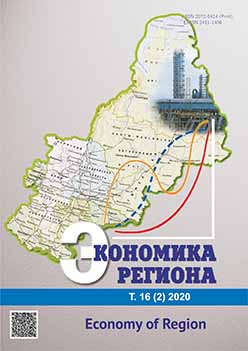ОЦЕНКА ЭФФЕКТИВНОСТИ ИНСТРУМЕНТОВ РЕГИОНАЛЬНОЙ ПОЛИТИКИ
Assessing the Efficiency of Regional Policy Tools
Author(s): Aleksandr Vladimirovich KotovSubject(s): Economy
Published by: Институт экономики Уральского отделения Российской академии наук
Keywords: tools; regional policy; spatial development; performance assessment; methods; foreign experience; short-term and long-term effects; exogenous growth; endogenous growth theory
Summary/Abstract: Implementing the Strategy of Spatial Development of the Russian Federation involves various regional policy measures and requires choosing the most appropriate tools. The issue gains importance in case of combining the search for additional sources of growth with an integrated system for assessing the efficiency of the existing measures. Admittedly, such system in the Russian Federation is still in its formation. Therefore, in order to implement public policy, it is crucial to critically analyse the most significant aspects of the methodology for assessing the efficiency. The concept of «efficiency», apart from efficiency itself, includes he performance, impact, and usability of the tool. The assessment of the efficiency varies in different countries, as it is not a single practice that can be applied regardless of geographical and historical context. The paper substantiates the idea that the assessment of the efficiency includes the examination of social, cultural and political elements. The assessment is a flexible management tool, not just an instrument demonstrating the reduction of regional differences. Drawing on the principles of spatial hierarchy, the paper suggests assessing the efficiency of regional policy tools at the macro-, meso- and micro-regional levels. The assessment focuses on solving four large classes of applied problems: provision of public goods, forms of the spatial organisation of the economy, implementation of regional and macro-regional programs, and the development of large projects. The characteristics of the assessment of the efficiency depend on the choice of either endogenous or exogenous growth theory. Additionally, the assessment of the efficiency of a variety of programs (multi-criteria evaluation) specifically differs from the assessment of individual programs of spatial development. It is advisable to consider the practice of assessment in a broader context, not just as a task of financial and management control. The research findings can be used for creating an integrated system that provides feedback, organises the consequences of regional policies and the effects of achieving national development goals.
Journal: Экономика региона
- Issue Year: 16/2020
- Issue No: 2
- Page Range: 352-362
- Page Count: 11
- Language: Russian

